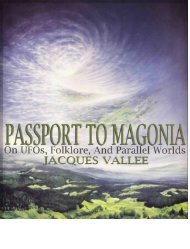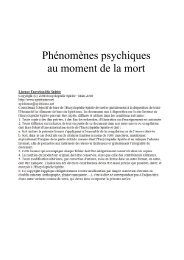extraordinary%20encounters
extraordinary%20encounters
extraordinary%20encounters
You also want an ePaper? Increase the reach of your titles
YUMPU automatically turns print PDFs into web optimized ePapers that Google loves.
32 Atlantis<br />
That is not all the dialogues have to say,<br />
however. Most of the discussion, much of it<br />
intricately detailed, describes a civilization<br />
that was nearly perfect before pride corrupted<br />
it. Atlantis is supposed to be the place of<br />
model governance. In its prime it operated by<br />
the principles set forth in The Republic.<br />
No other ancient document contains an independent<br />
treatment of Atlantis. All references<br />
to the lost continent cite Plato as the<br />
source. Some accept Plato’s account as historical,<br />
while others see it as an allegory never<br />
meant to be taken literally. Plato’s own student<br />
Aristotle took the latter view.<br />
During the sixteenth and seventeenth centuries,<br />
as European explorers found their way<br />
to the Americas, several writers, most prominently<br />
Sir Francis Bacon (1551–1626), revived<br />
the myth of Atlantis and theorized that<br />
its remains could be found in the New World.<br />
That would be only the beginning of a new<br />
round of speculation. “At one time or another,”<br />
a modern chronicler of the legend observes,<br />
“Atlantis has been located in the Arctic,<br />
Nigeria, the Caucasus, the Crimea, North<br />
Africa, the Sahara, Malta, Spain, central<br />
France, Belgium, the Netherlands, the North<br />
Sea, the Bahamas, and various other locations<br />
in North and South America” (Ellis, 1998).<br />
Among the most influential books ever<br />
written on the subject, Atlantis: The Antedilu -<br />
vian World (1882) was the creation of a former<br />
Minnesota congressman named Ignatius<br />
Donnelly (1831–1901). Donnelly surveyed<br />
what he presented as evidence from such disciplines<br />
as archaeology, geology, biology, linguistics,<br />
history, and folklore to argue vigorously<br />
for the proposition that Atlantis not<br />
only existed but was the place where human<br />
beings became civilized. Atlantis sent its people<br />
all over the world and seeded the earth.<br />
The great gods and goddesses of the ancient<br />
world were based on the leaders and heroes of<br />
Atlantis; worldwide legends of a mighty deluge<br />
owe their origins to dim memories of the<br />
catastrophe that overwhelmed Atlantis. The<br />
historical civilization influenced most directly<br />
by Atlantis was ancient Egypt.<br />
These re velations sparked international<br />
i n t e rest, and Do n n e l l y’s book went thro u g h<br />
many printings. For a time even some re putable<br />
scientists we re willing to consider the<br />
possibility that the legend was true, after all.<br />
Indeed, Donnelly was elected to the American<br />
Association for the Ad vancement of Science.<br />
Be f o re long, howe ve r, as critics exposed<br />
the book’s errors, exaggerations, and assort e d<br />
scholarly shortcomings, belief in At l a n t i s<br />
m oved to the occult fringes, to be championed<br />
by the likes of Theosophy founder Helena<br />
Pe t rovna Bl a vatsky and other philosophers<br />
of the esoteric. Be f o re the end of the<br />
nineteenth century, a growing body of occult<br />
l i t e r a t u re attested that Atlantis was advanced,<br />
not just by the standards of their<br />
time, but by modern times as well; it possessed<br />
a super science that, among other<br />
m a rvelous accomplishments, had inve n t e d<br />
airplanes and television.<br />
The Scottish folklorist and occultist Lewis<br />
Spence, who took a relatively more conservative<br />
approach, wrote five books on Atlantis<br />
between 1924 and 1943, citing Donnelly and<br />
his methodology as his principal inspiration.<br />
Bowing to the consensus view of historians<br />
and archaeologists, who held that human beings<br />
were living in caves nine thousand years<br />
before Plato’s time, Spence held that Atlantis<br />
had existed nine hundred years before Plato.<br />
Meanwhile, allegations, rumors, and outright<br />
hoaxes of archaeological “discoveries” of Atlantean<br />
artifacts filled the popular press and<br />
kept the “mystery” alive.<br />
The much-circulated channelings of Ed g a r<br />
C a yce (1877–1945), called the “s l e e p i n g<br />
p ro p h e t” because of the state of consciousness<br />
in which he vo c a l i zed his psychic re a d i n g s ,<br />
often concerned Atlantis. Many who came to<br />
him for psychic guidance learned that they had<br />
been Atlanteans in previous lives. In Cayc e’s<br />
c o m p re h e n s i ve re-envisioning of the lost continent,<br />
Atlantis was essentially where Plato had<br />
placed it: between the Gulf of Mexico and the<br />
Mediterranean. Unlike Pl a t o’s, Cayc e’s At l a n t i s<br />
was as advanced as mid-twe n t i e t h - c e n t u ry<br />
America, and in a number of ways more ad-





